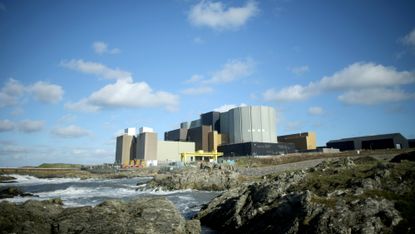Instant Opinion: Hitachi ‘failed its nuclear test’
Your guide to the best columns and commentary on Friday 18 September

The Week’s daily round-up highlights the five best opinion pieces from across the British and international media, with excerpts from each.
1. Simon Jenkins in The Guardian
on misplaced priorities
Subscribe to The Week
Escape your echo chamber. Get the facts behind the news, plus analysis from multiple perspectives.

Sign up for The Week's Free Newsletters
From our morning news briefing to a weekly Good News Newsletter, get the best of The Week delivered directly to your inbox.
From our morning news briefing to a weekly Good News Newsletter, get the best of The Week delivered directly to your inbox.
Hitachi failed its nuclear test. If only it had the vanity of HS2
“What has been intriguing about HS2, like Hinkley Point, is its political invulnerability. From now on it will be charging British taxpayers over £100m a week for the scheduled 20 years of the project. The sums are so stupefying as to have an inverse effect. They are taken as a sign of political machismo, of ‘build, build, build’. Opponents have included even Johnson and his svengali, Dominic Cummings. Other ministers are only too aware that £100m a week cannot avoid impacting on their projects.”
2. Paul Waldman in the Washington Post
on a muddled message
Trump can’t decide whom he should tell people to hate
“It’s almost as though the idea that Joe Biden is responsible for violence that occurs while Donald Trump is president makes about as much sense as the idea that Biden should have implemented a national mask mandate. The public, whose ability to rationally weigh evidence and logic is sometimes limited, seems nonetheless to have grasped that Trump’s claim to be the guarantor of order made little sense.During his convention speech, Trump said ‘No one will be safe in Biden’s America.’ But the fear of chaos and societal dissolution should Biden be elected doesn’t seem to have taken hold.”
3. Fionola Meredith in The Belfast Telegraph
on backstabbing your fellow citizens
Snooping, squealing and snitching is the wrong remedy
“Snitching. It sounds so innocent doesn't it? Harmless schoolyard stuff. Running to tell teacher that Micky was the one who drew a rude picture on the blackboard, that kind of thing. But if your memory stretches back as far as your schooldays you'll recall that the kids who routinely "told on" others for minor instances of wrongdoing were never popular. That's because trying to get other people into trouble while burnishing your own standing as a virtuous upholder of official authority is deeply unattractive behaviour. Most children know this instinctively. But there's always a few who don't.”
4. Julia Hurst in Politico
on Rio Tinto’s rampant destruction
Why Australia fails to protect its heritage
“Rio Tinto knew the site was of international significance and held evidence of 46,000 years of continuous human occupation across a changing climate, including the last Ice Age. Archaeologists had salvaged more than 7,000 artifacts - some more than 40,000 years old - from the area. One of the artifacts was a 4,000-year-old plait of human hair, which represented a precious genetic link to present-day Traditional Owners. In regular meetings with Rio Tinto, they had tried to stop the destruction of the caves from proceeding, reminding the company that the site was ‘one of the most sacred sites in the Pilbara region’. And yet, on Australia’s National Sorry Day - which remembers the mistreatment of Aboriginal and Torres Strait Island people who were forcibly removed from their families and communities - Rio Tinto went ahead with its plans.”
5. Bryan Knight in Al Jazeera
on a nuanced history
The pitfalls of glamorising Black Power activism
“‘Black Power!’ was an utterance popularised by radical Black activists in the 1960s and 1970s. Although often ignored ideologically, the iconography of Black Power continues to be circulated in popular culture - without a thorough engagement with the politics that led to its creation. The glamorisation of Black Power imagery is a phenomenon that stretches as far back as the 1960s. However, with the resurgence of the Black Lives Matter movement, it is time that we move beyond our obsession with revolutionary aesthetics and engage with its politics.”
Create an account with the same email registered to your subscription to unlock access.
Sign up for Today's Best Articles in your inbox
A free daily email with the biggest news stories of the day – and the best features from TheWeek.com
-
 Today's political cartoons - May 18, 2024
Today's political cartoons - May 18, 2024Cartoons Saturday's cartoons - a rocky road, innovative legislation, and more
By The Week US Published
-
 5 arguably hilarious cartoons about the 2024 presidential debate
5 arguably hilarious cartoons about the 2024 presidential debateCartoons Artists take on the candidates' age gap, sleepyheads, and more
By The Week US Published
-
 Kingdom of the Planet of the Apes: a solid summer blockbuster
Kingdom of the Planet of the Apes: a solid summer blockbusterThe Week Recommends The big-money movie might be 'a bit silly' but the effects are excellent
By The Week UK Published
-
 Mouse keeps tidying up man's shed
Mouse keeps tidying up man's shedTall Tales And other stories from the stranger side of life
By Chas Newkey-Burden, The Week UK Published
-
 'Dead' woman nearly suffocated in morgue bag
'Dead' woman nearly suffocated in morgue bagTall Tales And other stories from the stranger side of life
By Chas Newkey-Burden, The Week UK Published
-
 ‘Irony’ as Zoom calls staff back to office
‘Irony’ as Zoom calls staff back to officefeature And other stories from the stranger side of life
By Chas Newkey-Burden Published
-
 The U.S. veterinarian shortage crisis
The U.S. veterinarian shortage crisisSpeed Read With an anticipated shortage of 15,000 vets by 2030, it will be harder to get care for pets
By Catherine Garcia Published
-
 Joker causes shark panic in Torquay
Joker causes shark panic in Torquayfeature And other stories from the stranger side of life
By Chas Newkey-Burden Published
-
 Company teaches mask-wearers to smile again
Company teaches mask-wearers to smile againfeature And other stories from the stranger side of life
By Chas Newkey-Burden Published
-
 George Floyd legacy: what has changed in the US three years on
George Floyd legacy: what has changed in the US three years onfeature Police officers are more accountable but has ‘white empathy’ hit a wall?
By Chas Newkey-Burden Published
-
 Global happiness has been 'remarkably resilient' over the past three years
Global happiness has been 'remarkably resilient' over the past three yearsfeature
By Devika Rao Published